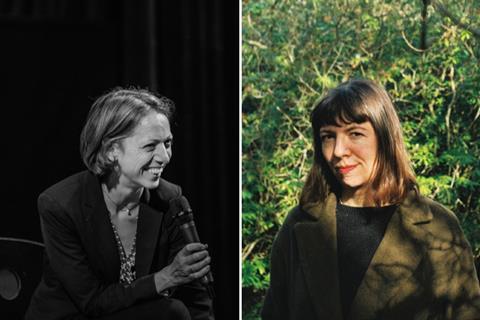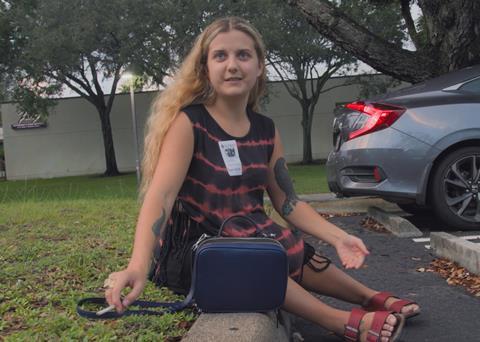
“Excitement, gratitude and pride,” are the words Edinburgh International Film Festival (EIFF) executive producer Tamara Van Strijthem is using to describe her feelings ahead of the return of the Edinburgh International Film Festival (EIFF, August 18-23), after a testing year for the UK festival.
“What happened in October was a massive shock,” adds EIFF programme director Kate Taylor, referring to the sudden closure of the Centre of the Moving Image (CMI), the umbrella charity which ran EIFF, the Edinburgh Filmhouse and the Belmont Filmhouse in Aberdeen, as it entered administration. Taylor had worked as a freelance programmer on last year’s edition of the festival.
“In November, there was a regrouping. Myself, [EIFF 2022 festival director] Kristy Matheson and [EIFF programmer] Holly Daniel made a proposal to do some research on good practice, and plan for a festival to happen,” she continues. “Edinburgh International Festival, which started at the same time as us, in 1947, stepped in as they felt we couldn’t miss a year, because it would be so hard to come back. They’ve given us a sisterly festival embrace and enabled us to spend time putting together a proposal.”
Screen Scotland bought the intellectual property rights to EIFF in December, and gave the team the thumbs up in February to put together a 2023 edition.
When Matheson was named as the new director of BFI London Film Festival in March,Taylor stepped up as programme director at EIFF. The team expanded to 14, with Van Strijthem joining in April as executive producer, having previously held posts at the Northern Film School, Refugee Festival Scotland and the BFI.
“From then, it was go, go, go,” said Taylor. “It’s been four months [to programme the festival], which is unusual, and not something I would choose to replicate, but it’s been a blast.
“We knew we wanted to deliver something at a manageable scale, so immediately we were looking at fewer films,” notes Taylor, with the 2022 edition hosting 87 feature films, while this year’s festival has 24 new features, plus five retrospective titles. “It’s got to be, to some extent, all killer, no filler, when you’ve got so few films. It becomes more of a curated programme.”
“Research has shown in the past that more than 50% of our audience is local. We want to offer the festival as a thank you to audiences who have been buoying us up for many years,” adds Van Strijthem. “There’s a strong presence of local audiences and film lovers, but we are always keen to build new audiences as well.”
Reconnection

Some programmes have had to be put on hold – youth and community engagement work that the festival previously had been doing all year round was halted, while a full industry programme is also not going ahead. EIFF is putting out the call, however, for former participants of EIFF’s industry or talent development schemes, or anyone who has screened a film at the festival, to get in touch for a networking opportunity at the festival, titled Talent Assemble.
Spotlighting new talent remains important to the festival’s DNA, with debut features in the programme including Janis Pugh’s Chuck Chuck Baby, Johnny Barrington’s opening night film Silent Roar, Rodger Griffiths’ Kill and Ella Glendining’s Is There Anybody Out There?.
Talent attendance is not expected to be impacted by the ongoing SAG-AFTRA strike, as was seen at last month’s Galway Film Fleadh. Due to attend are Silent Roar director Johnny Barrington, alongside the film’s stars Ella Lily Hyland, Louis McCartney, Mark Lockyer, and Chinenye Ezeudu; Scrapper filmmaker Charlotte Regan; Is There Anybody Out There? director Ella Glendining; Passages director Ira Sachs; Scrapper filmmaker Charlotte Reganl Trainspotting author Irvine Welsh, the subject of EIFF doc Choose Irvine Welsh; and closing night film Fremont director Babak Jalali and writer Carolina Cavalli.
The beloved annual cèilidh will be returning, although on a smaller scale than previous years.
Crossover events with the wider Edinburgh festivals include the Sunday Salons, in which a line-up of artists discuss the finer details of their work, one taking place with the Edinburgh Art Festival and one with the Edinburgh Book Festival. Screen Fringe also returns, the initiative spearheaded by Screen Scotland, in which creative executives, talent agents and producers from the film and TV sector are connected with writing, directing and performing talent at Edinburgh Festival Fringe.
“The future is still to be written”
Taylor, Van Strijthem and the rest of the EIFF staff are on fixed contracts that terminate in September, and do not know if their contracts will be renewed or extended. Screen Scotland has recruited Trainspotting producer Andrew Macdonald as a chair, in what will initially be a voluntary position, to lead on the formation and operation of the EIFF from 2024 onwards.
“We are working with Screen Scotland on those plans, and supporting them in any capacity we can, but the future is still to be written for the festival,” says Van Strijthem.
“This year is a unique set of circumstances,” reflects Taylor, of this year’s streamlined edition. “We’ve landed on a form that can be joyous and exciting. But it’s a form I imagine will change in the future again. Our main job is to put the festival in a position to see it continue and thrive.”
“We can’t understate how important it is for Edinburgh to be home to a film festival this year, considering the lack of provision for cultural cinema in the city,” believes Van Strijthem. “There’s a need, appetite and desire for this kind of event to take place in Edinburgh this year, and beyond.















![[L-R]: Amanda Villavieja, Laia Casanovas, Yasmina Praderas](https://d1nslcd7m2225b.cloudfront.net/Pictures/274x183/6/4/1/1471641_pxl_20251224_103354743_618426_crop.jpg)









No comments yet